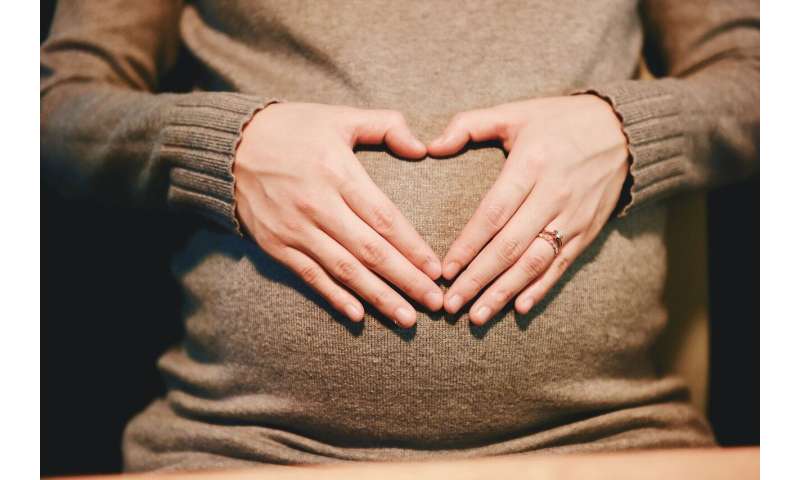Pregnant women excluded from three-quarters of COVID-19 treatment trials


Pregnant women are among those most in need of safe and effective therapies against COVID-19, but they are routinely excluded from the majority of clinical treatment trials, according to authors of an opinion piece based on a review of international trial registry data, published in The Lancet Global Health journal.
Strikingly, three-quarters of COVID-19 trials reviewed specifically excluded expectant mothers, even though they were investigating medications and vitamins that already have a relatively favorable safety profile during pregnancy, or that are already used in pregnant women.
In the Viewpoint, authors raise concerns that the ongoing exclusion of pregnant women will result in lost opportunities to ensure the effectiveness and safety of treatments in expectant mothers who may be at increased risk of severe outcomes from COVID-19 illness. They argue that given the scale of the pandemic and those that will inevitably follow, there is a public health obligation to include pregnant women in treatment trials to identify and provide appropriate management and care.
“Without explicit and proactive efforts to recruit and retain pregnant women in therapeutic trials for COVID-19, expectant mothers will suffer from having fewer medical options available to them, because we are not including them in clinical trials”, says author Dr. Melanie Taylor from WHO in Switzerland and the US Centers for Disease Control and Prevention. “There is a very real possibility that treatment could become approved for treatment of COVID-19 without evidence-based guidance for use in pregnant women.”
As co-author Dr. Loulou Kobeissi from WHO and HRP in Switzerland explains: “The systematic exclusion of pregnant women cannot be justified on the basis of safety as many of the medications being evaluated are either not harmful in pregnancy, or their risks are minimal. We are concerned that the resulting evidence gaps and delays will limit our understanding of the effects of treatment, dosing, and side effects in this important population, which can be vastly different from other groups due to the physiological changes that come with pregnancy.”
The call echoes growing appeals from leading medical societies for pregnant women to be included in COVID-19 vaccine and treatment trials, including the American Academy of Obstetrics and Gynecologists, the Society of Fetal Medicine, and 17 US medical societies. While available evidence is limited, pregnant women with COVID-19 appear more likely to need intensive care and mechanical ventilation than non-pregnant women, although the reasons for this increased risk remain unclear.
Despite the surge in clinical treatment trials for COVID-19, the proportion excluding pregnant women remains consistently high. The Viewpoint, based on a review of data from 10 WHO-recognized international clinical trial registries, determined that 80% (124) of 155 clinical treatment trials of COVID-19 registered in April 2020, and 75% (538) of 722 trials in July 2020, specifically excluded pregnant women.
Crucially, the authors note, expectant mothers were excluded in three-quarters (130/176) of trials investigating six key drug treatments (lopinavir/ritonavir, chloroquine and hydroxychloroquine, remdesivir, interferon beta, ivermectin, and corticosteroids) previously used as treatments in pregnant women (see panel), as well as most (77%; 27/35) trials evaluating high-dose vitamins (ie, A B-complex, C, D, E, and zinc) for which safety data show no, or minimal risk, of adverse pregnancy or birth outcomes.
The authors also investigated the inclusion eligibility criteria for these trials and found that the principle researchers of these trials did not include an explanation for why pregnant women were excluded. They believe that pregnant women’s exclusion from COVID-19 trials is likely happening due to perceived risks around use in expectant mothers and medication exposure to foetuses or neonates.
But in 2016, the Council of International Organizations of Medical Sciences (CIOMS) issued international ethical guidelines proposing that expectant mothers should not be considered vulnerable in clinical research, and provided detailed guidance on how to safely include pregnant and breastfeeding women in clinical trials. Since then, numerous medical societies have recommended their inclusion in COVID-19 treatment trials.
The Viewpoint authors argue that pregnant women should be given the right to make their own informed decision to participate in clinical studies, based on understanding the associated potential benefits and harms of treatment.
“Pregnant women are among the least likely to have robust, timely evidence to inform decisions around their care”, says Dr. Caron Kim, one of the authors from WHO and HRP in Switzerland. “Categorizing women as members of a vulnerable group on the basis of pregnancy status alone, rather than as individuals who are pregnant at the time of the trial, limits their individual choice, and access to potentially life-saving treatment.”
Source: Read Full Article